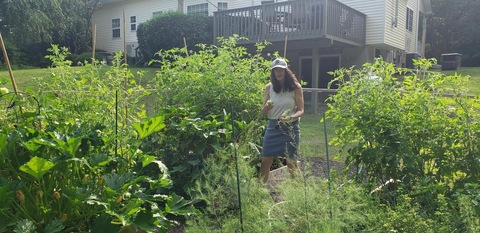
It's wanting to know that matters. Otherwise we are going out the way we came in…What we let fall will be picked up by those behind. The procession is very long and life is short…
-from Tom Stoppard's play, Arcadia
. . .for the designated successor to royal authority, the Sovereign People, was no more capable than Louis XVI of reconciling freedom with power.
-Simon Schama, Citizens: A Chronicle of the French Revolution
This morning, the morning after the umpteenth assassination and/or assassination attempt against a politician or activist in the United States in my lifetime alone, I decided to get out early to walk my compost down to the Huguenot Street community garden. I could not shut down the news, though I thought it would do me good. "Composting, at least, is something practical to sustain hope," I wrote on What's App to a friend in the UK, now celebrating its Labour Party victory. I finally shut the news down when a bystander on the Washington Post podcast I was listening to said, "We went home and listened to Fox News." Fists in the air, threats, revenge, retribution, grievance, Project 2025, none of this is good news.
I thought of Stoppard's play, Arcadia, kept it in mind as I continued my walk. Life has become "a Gothic novel expressed in landscape," Stoppard wrote, except that the landscape when contemplated in silence is also solace. Gardens, even indoor plants, become our Arcadias, utopian visions of unspoiled wilderness where we are able to rest and refresh our spirits, perhaps even begin again. Isn't this also what revolutions promise: beginning again? Weren't our "founders" hopeful? Has the American "experiment" utterly failed? Do we have time to steady the ship and move forward? Are these pointless rhetorical questions?
And then there is the extreme weather this summer which came upon us without warning, we thought. Well, not exactly; we had been amply warned. But the reality was bone thumping: an early hurricane, constant 90 degree days without much respite, and even the pool water will not cool. I lap swim and then stand under the outdoor cold shower near the changing rooms, sit on a bench, and catch my breath before heading home to AC. I still walk to the pool, water bottle in hand, doused with electrolytes. And every ten laps, I drink, but the water in the bottle has warmed to tea temperature and the post-swim alcohol drops for my ears are almost dangerously hot.
And so it goes these days, as Kurt Vonnegut would say. So it goes.
This post is dedicated to all the brave young Democrats running for office this year, many under siege on social media, and serious physical threat. May their courage inspire those of us who will vote for them and work to get out the vote. May our election poll workers remain steadfast and unafraid.








